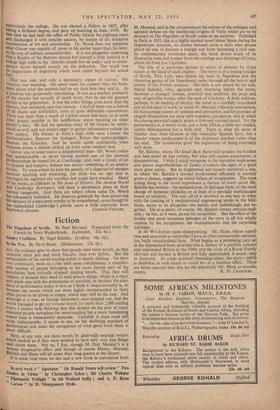Fiction
ALL the evidence goes to show that people read more novels, as they consume more jam and more biscuits, than ever before. But the composition of the novel-reading public is clearly shifting. On their own confession, made as a rule with some complacency, a consider- able number of people belonging to the more literate part of the Population have .virtually stopped reading novels. This, they will explain, is because they need to read serious things, which is a short and quick way with the pretensions of novelists, or because the stan- dard of performance today is low, as I think it unquestionably is, or because the novels which are most highly recommended to them often prove to be trivial or empty, which may well be the case. And although it is true, as George Saintsbury once pointed out, that the world managed to get on without novels for more than 2,000 reading Years, I cannot help thinking that this disdain on the part of many educated people nowadays for novel-reading has a more threatening aspect than is immediately apparent. Certainly it must react still More unfavourably, it seems to me, on the declining standard of Performance and make the recognition of what good work there is more difficult.
Here, at any rate, are three novels by deservedly popular writers Which looked as if they were entitled to have only very nice things said about them. Not so, I fear, though M. Paul Morand's is a serious imaginative effort and though of course Messrs. Morand, Balchin and Shute will all retain their long queues at the library. It is some time since we last had a new book in translation from
In next week's " Spectator " Sir Ronald Storrs will review " Two studies in Virtue " by Christopher Sykes ; Sir Charles Webster i Diplomatic Twilight " by Sir Walford Selby ; and A. P. Ryan .‘ Carson " by H. Montgomery Hyde.
M. Morand, and in the circumstances the echoes of the unhappy and agitated debate on the intellectual origins of Vichy which are to be detected in The Flagellant of Seville come as no surprise. Published in Paris in 1951, this is a highly studied novel about Spain during the Napoleonic invasion, its drama focused upon a hero who desires above all else to prevent a foreign war from becoming a civil war. Its contemporary overtones apart, the book draws much of its illustrative tone and temper from the etchings and drawings of Goya, above all from Los Caprichos.
The title of a particular picture or series of pictures by Goya stands at the head of each chapter. The story is of a young hidalgo of Seville, Don Luis, who retains his faith in Napoleon and the liberating genius of the Napoleonic order through all the horror and cruelty of the French invasion. His faith is not shared by his wife, Maria Soledad, who, ignorant and charming before the event, becomes a changed woman, practical and unafraid, the prop and stay of guerrilla troops, after the sack of Cordoba. A little dubious, perhaps, in its reading of history, the novel is a carefully considered and stylish piece of work, in which M. Morand's Spanish atmosphere, his Goya-esque scenes of violence and corruption, and his passages of elegant disquisition are done with excellent calculation, and in which the closing personal tragedy points a firm and rational moral. Yet the performance is, it seems to me, just a little lifeless, a little too studied, visibly distinguished but a little dull. There is, after all, more of Hamlet than Don Quixote in this ostensibly Spanish hero, but a Hamlet whose predicament is of the cloistered intellect rather than the soul. The translation gives the impression of being extremely well done.
Mr. Balchin, whose The Small Back Room still remains the liveliest and best novel he has written, but who still excites expectation, is disappointing. I wish I could recognise in the narrative weaknesses and patent improbabilities of Sundry Creditors the signs of a good story gone astray. But so fragmented and loosely contrived a tale, in which Mr. Balchin's normal professional efficiency is scarcely given a chance, suggests an initial failure of imagination. The most telling thing in the novel reproduces a feature of every novel Mr. Balchin has written—the manipulation, in dialogue form, of the small change of domestic infelicity, or at least of a specially sophisticated brand of infelicity. The rest, all of it involved in one way or other with the running of a medium-sized engineering works in the Mid- lands, seems to be altogether too hastily and unthinkingly put to- gether. Up to a point, of course, Mr. Balchin always remains read- able ; he has, as it were, an ear for readability. But the effect of the livelier and more veracious passages of the story is all but wholly undone by the scrappiness, the inconsistencies and the surprising naiveties.
In the Wet is even more disappointing. Mr. Shute, whose superb ease and assurance as storyteller I have so often unreservedly admired, has badly miscalculated here. What begins as a promising yarn sot in the Queensland bush develops into a fantasy of a sordidly reduced and regimented Britain in the 1980s and the trials of a Royal Family chivvied and harried in Britain and fully appreciated, it seems, only in Australia. Its crude political theorising apart, the story—which is doubtless as well meant as could be—is a tasteless affair. There are better reasons than this for the popularity Mr. Shute as novelist


































 Previous page
Previous page